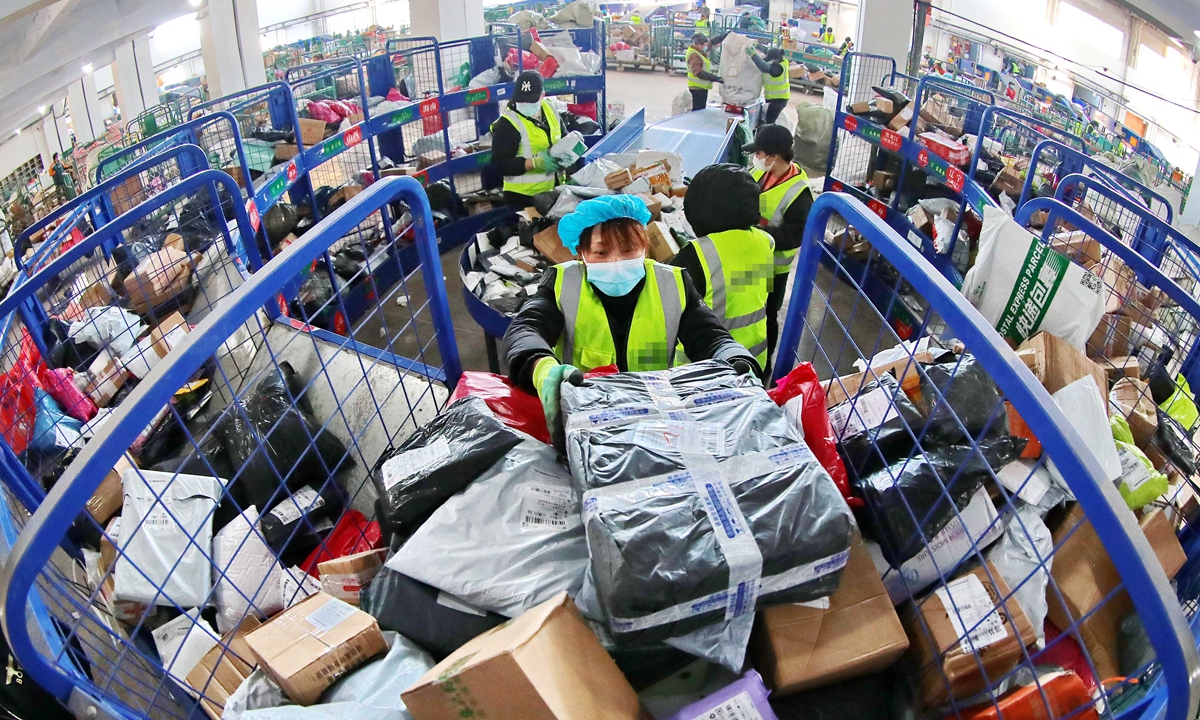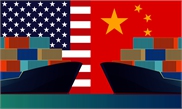US' IPR report a political tool to slander China
Repeated slander against Chinese firms politically motivated: expert

Logistics company staff sort packages at a storage center in Qinhuangdao, North China's Hebei Province on November 10, 2021 as huge amounts of goods flood in amid the Double 11 online shopping festival. Photo: VCG
The US government's latest ill-intended report on "notorious markets," repeating frivolous claims against China's protection of intellectual property rights (IPRs) and operation of Chinese online platforms, is a political tool and lacks any credibility, Chinese experts said on Wednesday.
Released by the office of the US Trade Representative (USTR) on Tuesday, the report alleged that China leads the world in making "counterfeit and pirated products", and it also targeted Chinese internet giants, including WeChat, which the USTR alleges to be "one of the largest platforms for counterfeit goods."
While the report also identified 17 other countries as "failing to address the trade of counterfeit goods", it appears to be primarily targeting China. In addition to WeChat, other Chinese online platforms such as AliExpress, Baidu Wangpan, DHGate, Pinduoduo and Taobao were also named. The list also includes three new physical markets in China.
While the report contained wanton claims against China and Chinese companies, it does not have any weight. The report failed to draw any attention in China on Wednesday, as the US has repeatedly made such allegations against China's IPR protection in order to contain China.
Experts noted that the USTR report is not only filled with wrong, biased accusations, but is also losing its credibility as it has become a political tool for the US government to smear other countries.
"The US IPR report has fallen to be a political and economic coercion tool of Washington, in its veiled attempt to impose the 'long-arm jurisdiction' on other countries' companies," Gao Lingyun, an expert at the Chinese Academy of Social Sciences in Beijing, told the Global Times on Wednesday.
"The report cannot accurately reflect the efforts those companies have made in recent years in protecting intellectual property rights," Gao said.
Chinese companies like Alibaba and Tencent are listed in the report almost every year, despite serious pushback from the companies and their efforts to clamp down on counterfeit goods.
Tencent, the parent company of WeChat, expressed strong opposition to the report and noted its efforts in stopping IPR infringements and investment in protecting IPR.
Alibaba noted that it has enhanced IPR protection by tapping new technology such as artificial intelligence and information technology innovations. The Alibaba Anti-Counterfeiting Alliance (AACA), which the Alibaba Group founded in 2017, has evolved into a full-fledged IP-protection ecosystem. As of October 31 last year, 220 members and more than 1,000 brands from 21 countries and regions had joined the alliance, according to Xu Jun, head of Alibaba's IPR operation unit.
Chinese officials have strongly criticized the USTR report for politicizing trade issues.
Following the USTR's report in 2022, a spokesperson from China's Foreign Ministry urged the US side to stop politicizing economic and trade issues, view Chinese companies' efforts and achievements in IPR protection in a comprehensive, objective and just manner, and foster an open, fair and non-discriminatory business environment for Chinese and US companies.
Zhao Zhanling, a research fellow at the Center for IPR Studies at China University of Political Science and Law, told the Global Times that China has been attaching great importance to IPR protection over the past years as China's economy has expanded.
"In recent years, technology enterprises are mushrooming in China, enhancing the nation's international status as an innovation power," Zhao said.
China had registered 4.212 million valid patents as of the end of 2022, making it the first country to pass the threshold of 3 million, data from the National Intellectual Property Administration showed in January. The number manifests that the nation has been ramping up efforts to become a global innovation front-runner.
The Chinese mainland climbed to 11th place on the Global Innovation Index 2022 released by the World Intellectual Property Organization in September last year, up one place from its 2021 ranking, marking the Chinese mainland's 10th consecutive ascent.

